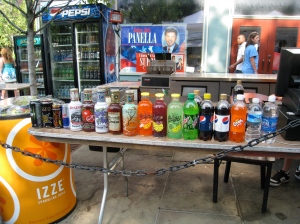
Last year at Harvard School of Public Health (HSPH) I attended a weekly seminar class. It took place during lunch so we were regularly provided with a platter of fresh fruit and some drinks to compliment whatever quick sandwich or salad we brought with us. The drinks on display were usually fruit flavored seltzer waters and Diet Coke. While we weren't offered regular Coke, I found it rather unusual that our school would still provide its artificially-sweetened peer.
This question of whether diet soda is a 'healthy' alternative for someone cutting back on sugar-sweetened beverages (sodas, energy drinks, fruit juices, and most of those ice teas and lemonades...even fruit-flavored waters...) is one that I have often thought about. If HSPH does not provide regular sodas, why diet? Must we provide soda?A brief article today in the Boston Globe entitled 'Health officials are not too sweet on diet soft drinks either' revisit the controversy over artificially sweetened beverages and their place (or lack of it) in changing America's liquid consumption. Surprisingly (at least to me) Dr. Walter Willett, chair of the HSPH nutrition department, was quoted in support of diet soda, at least relative to its high-fructose corn syrup laden counterpart.
However, some research on the topic suggests that both sugary and diet sodas can increase a person's risk for poor health outcomes (the article cites an increased risk of metabolic syndrome, linked to heart disease or stroke). Also, as I have heard before, artificial sweeteners can trick the body into expecting a rush of calories from sugar and when it never arrives can lead to problems with one's metabolism and result in overeating later in the day.
While diet sodas may be a stepping stone on the path toward more healthful beverages, they should not be viewed as a healthy. More importantly, they should not be consumed by children (at least not regularly) given their link to metabolic disorders. We have enough metabolism problems as we age already -- let's not start that process in childhood!
What do you think? Do public health advocates need to embrace diet beverages in hopes of reaching those people who are now consuming the high-calorie sugar sweetened sodas? Or is it better to advocate for natural beverages (not artificial, not sugar-sweetened) and leave the diet soda marketing up to the beverage industry. Their budget is big enough, no?



No comments:
Post a Comment